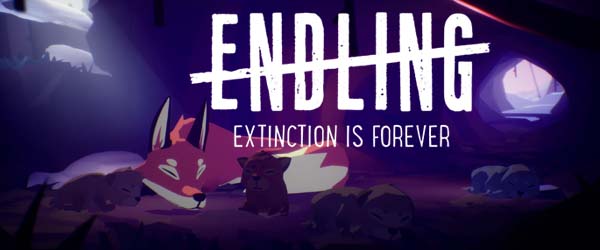
Hey! I finally actually downloaded and played one of the PSN free monthly games for a change! Endling: Extinction Is Forever has been on my Steam wishlist for a while, but I passed on buying it during this summer sale because I instead spent most of my summer sale money on vintage Star Trek games as research for an upcoming video essay. Well, I got lucky because a week or 2 later, Endling showed up, for free, on the PSN!
Endling: Extinction Is Forever may look like a cutesy little indie game featuring a cute little fox taking care of her cute little fox babies in a beautiful, lush, vibrantly-animated forest. But as the game's title should hopefully suggest, this game is not nearly as cute and pastoral as the thumbnail suggests. Endling is actually quite a bleak and depressing game that addresses ecological collapse, species extinction, corporate greed, the cruelty of humans when they're desperate, and other similar themes.
It has sparks of optimism. There are opportunities to show compassion and to cooperate with other animals and humans. But they are fleeting, and often punctuate tragedy anyway.
There are brief flickers of compassion and optimism, but Endling is an overall bleak game.
So yes, if you download this game, you will get cute, cartoon foxes frolicking in vibrantly-colored woods. And they are adorable and charming. But then again, Bambi and The Land Before Time were also colorfully-animated movies about cute woodland critters, and ... well ...
Motherly instinct
The game begins with the player controlling a fox escaping a raging forest fire. She reaches her den and it is revealed that she is pregnant, and she immediately gives birth to four little fox pups, which the player can customize with different colors to add your own personal touch to the game. But before you can even get around to naming them, a monstrous human hunter reaches into the den, grabs one of the pups, and kidnaps it. You now have 3 little fox pups who are wholly dependent on you, and it is your job to keep them fed and safe.
The gameplay loop consists of leaving the den each night to explore the forest and scavenge or hunt for food to feed your remaining pups, while also, occasionally picking up the trail of the human hunter who kidnapped your fourth pup. Then you must return to your den before the sun comes up, or else the forest will become populated with human hunters and trappers who will relentlessly pursue you and your pups for your meat and skins. And if you fail to find enough food in a given day, one of the cubs will starve to death.
As the game progresses, the humans destroy more and more of the ecosystem.
As you explore, your cubs may also learn various survival skills of their own, which allows them to reach new places, or access food that the mother fox cannot reach. There are some skills that all the pups can learn, but most skills can only be learned by a single pup in a given playthrough, which means that using that pup's skill to access a hard-to-reach place will mean leaving the other cubs behind.
[More]
3.0 [1 rating(s)] - Currently 3.0/5 Stars.
- 1
- 2
- 3
- 4
- 5
Tags:endling, Endling: Extinction Is Forever, Herobeat Studios, Handy Games, fox, cub, mother, children, deforestation, survival, food
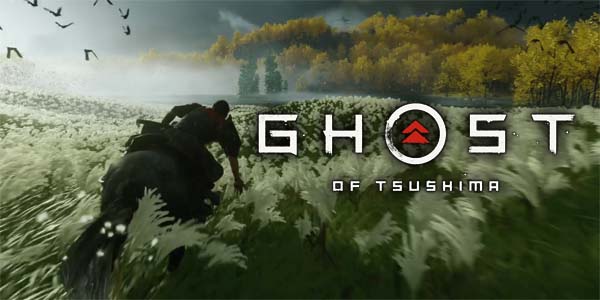
I don't recall the last time I played an open world sandbox game through to the end credits prior to writing a review for it. Usually, I've made my decision about the game long before credits roll. If I like the game, I usually stop before it becomes too tedious, finish up my review, move on to something else, and I rarely ever go back to finish these games. That was the case with Assassin's Creed: Black Flag, Shadow of Mordor, and others. Ghost of Tsushima is a rare instance of me actually liking an open world sandbox game enough that I couldn't stop playing.
One of the sad ironies for me, as an amateur critic, is that I usually play a game longer if I don't like it -- sometimes all the way to end credits. As was the case with Assassin's Creed III and Shadow of War. This is because I want to find out if there's anything late in the game that might redeem it -- even if in some small way.
In this regard, Ghost of Tsushima is a rare exception. I was enjoying the heck out of the game and wanted to see how it ends before I commit to a review. It wasn't even a case of me rushing through the main story just to get it over with (as is the case with many bad open world games). In fact, I completed all the side missions (including the mythic missions), liberated a majority of the occupied towns, and found a majority of all collectibles. I might even play some of the epilogue. So I can say without reservation that I like this game! And it all begins with the presentation.
This is not a promotional still! Nor was it taken with the included "photo mode".
This is just what the game looks like!
You have to see it to believe it
Ghost of Tsushima is not necessarily the most technically impressive game that I've played. Games like Red Dead Redemption II and The Last of Us Part II have had better facial animation, lighting, textures, and/or draw distance. But where Tsushima lacks in technical capabilities, it more than makes up for in aesthetics and artistry. The environments are beautiful, and the weather effects (especially wind effects) are second to none. Whether it's fields of vividly-colored flowers swaying in the wind, or ocean waves crashing on a sandy beach, or the plum trees on a rocky mountain dropping their blossoms into the breeze, or a thunderstorm threatening over the horizon, or a shinto temple towering over a forest of golden trees, there is something pretty to look at no matter where you go.
Screenshots do not do the game justice. You have to see it in HD motion to appreciate it.
I'm not normally one to gush over a game's graphics, but Ghost of Tsushima really stands out for its environmental design. Over the crest of every hill, it seemed a majestic screenshot opportunity awaited me. Picking just one or two to highlight in this review was a real challenge. Even the best screenshots that I could capture do not do the game justice. You really have to see it in high-definition motion (without the compression of an internet stream) to truly appreciate it.
I haven't seen weather effects this good since [maybe] The Witcher III.
This game is perfect as a virtual vacation during the travel-restricted social-distancing of the COVID-19 pandemic. Or at least, it would be, if not for the densely-packed sandbox content making it so that I can't take 10 steps without running into an ambient encounter of some kind. I could be trotting along on my horse through a forest lit with the golden glow of a sunset beaming through the canopy, with the serene ambiance of the wind harmonizing with the background music of Japanese flutes. But I can't enjoy this serenity for more than 5 seconds before a pack of Mongols shows up, the flutes give way to battle drums, and it's back to the swinging of swords and showers of blood. [More]
5.0 [1 rating(s)] - Currently 5.0/5 Stars.
- 1
- 2
- 3
- 4
- 5
Tags:Ghost of Tsushima, Sony, PlayStation, PS4, Sucker Punch, Japan, samurai, Mongols, Shinto, spiritualism, fox, open world, sandbox

On September 8, 1966, a cultural revolution started. The first episode of a new science fiction television series named Star Trek premiered on NBC. This series broke new ground in the genre of science fiction by being one of the first series ever to present high science fiction concepts to television audiences, while also using its space adventures as allegories for contemporary social and political issues. While it presented itself as mindless space adventure in the same vein as Buck Rogers and Flash Gordon, it took a serious approach to science fiction that (at the time) was limited to literature like the novels of H.G. Wells and the stories of Isaac Asimov.
Star Trek wasn't the first serious science fiction television series. Shows like The Twilight Zone and The Outer Limits had existed for a almost a decade. But Star Trek differed from these series in that it depicted a revolutionarily positive and uplifting version of the future of humanity during the height of the paranoia of the Cold War. Humanity, according to Star Trek would overcome the threat of mutual destruction that the Cold War between the United States and the Soviet Union posed, and we would come out the other side with a spirit of cooperation and a desire to peacefully and benevolently explore the stars, exploring strange new worlds and seeking out new life and new civilizations.
Television science fiction was dominated by childish adventures like Buck Rogers
and more cynical anthology series like The Twilight Zone that drew off of Cold War paranoia.
The show was created by Gene Roddenberry, a former United States army air force pilot and Los Angeles police officer who eventually found his calling as a television writer and producer. He wrote and produced some police dramas and westerns before pitching his defining project: Star Trek. The show was picked up by Desilu Productions, a company that was run by Lucille Ball (yes, the titular actress of I Love Lucy) and her husband. The production of Star Trek was tumultuous. The show was canceled by NBC after its second season, only to be revived due to an unprecedented, fervent letter-writing campaign staged by its fans. It did not survive its third season, however, as Desilu Productions was rapidly running out of money, was forced to cut budgets, and NBC moved the show to the dreaded Friday night "death" slot. In an age before DVRs, or even VCRs, if people were out on the town on a Friday night, and they missed an episode of a show, then that episode simply went unseen.
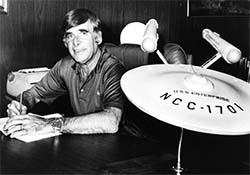
Gene Roddenberry's optimistic vision
of the future remains endearing.
The series eventually saw tremendous success after its cancellation due to its episodes being syndicated during the 1970's. It gained a cult following that grew and grew, setting up conventions that would come to draw thousands of attendees. Though not immediately apparent, Star Trek would grow to become one of (if not the) most successful science fiction properties in the world. The series is often cited by scientists, engineers, and astronauts as their inspirations for their careers, and the technology of the series has inspired many real-world technological innovations, such as wireless communication, mobile devices (in particularly mobile phones), speech-recognition software, and so on. Roddenberry became the first TV writer to receive a star on the Hollywood walk of fame, has been inducted into the Science Fiction Hall of Fame and the Academy of Television Arts & Sciences Hall of Fame, and was one of the first human beings ever to have his ashes carried into earth orbit... [More]
5.0 [2 rating(s)] - Currently 5.0/5 Stars.
- 1
- 2
- 3
- 4
- 5
Tags:Star Trek, Star Trek: the Next Generation, Star Trek: Deep Space Nine, Star Trek: Voyager, Star Trek: Enterprise, Star Trek: Discovery, Star Trek VI: the Undiscovered Country, Star Trek: Beyond, birthday, anniversary, science fiction, allegory, humanism, humanist, Gene Roddenberry, NBC, CBS, Fox, Paramount, Desilu Production, Lucille Ball, Cold War, Balance of Terror, The Measure of a Man, Kirk, Spock, Data, Gul Dukat, Seven of Nine, Star Trek the Experience, Las Vegas, Wallace Shawn, Grand Nagus Zek
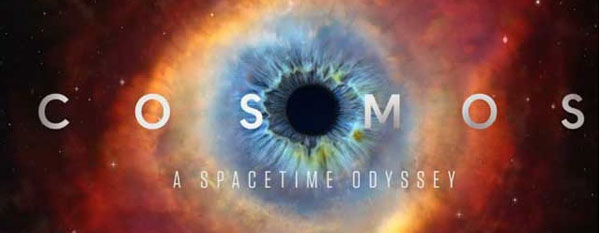
Last night, the first episode of the reboot/sequel to Carl Sagan's acclaimed series Cosmos premiered on FOX and National Geographic Channel. I'd been anticipating this show since it was announced last year, as the original Cosmos is one of the best educational programs that has ever been produced. This show is hosted by Neil deGrasse Tyson, whose passion and charisma makes him an excellent communicator of scientific ideas (right up there with Bill Nye) and fitting successor to Sagan.
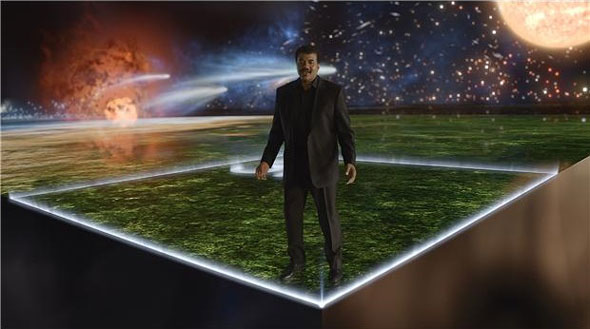
The new "cosmic calendar".
In this premiere episode, Tyson gives a brief tour of the solar system, recounts the story of Giordano Bruno, and introduces the viewer to Sagan's classic "cosmic calendar". The information presented in this episode is very high-level. I'm hoping that this is due to the introductory nature of this first episode, and that the remaining episodes will go into much greater depth and detail. However, I fear that the one-hour format will be too constraining for Tyson to provide any information of substance. Sagan's original series was made up of thirteen episodes each two hours long, and that format gave him the opportunity give more than just an introduction to a given topic, providing specific details on the evidences and experiments that lead to the discoveries he presented. Will Tyson have the time in later episodes to provide more information than one can get from the first paragraph of a Wikipedia article? I hope so. [More]
Be the first to rate this post - Currently .0/5 Stars.
- 1
- 2
- 3
- 4
- 5
Tags:Cosmos: A Spacetime Odyssey, cosmos, Neil deGrasse Tyson, Cosmos: A Personal Voyage, Carl Sagan, science, exploration, history, imagination, ship of the imagination, cosmic calendar, big bang, FOX, National Geographic, Ann Druyan, Seth MacFarlane, Brannon Braga
|

| 12 | | | | | | | 60 | | 11 | | | | | | | 55 | | 10 | | | | | | | 50 | | 09 | | | | | | | 45 | | 08 | | | | | | | 40 | | 07 | | | | | | | 35 | | 06 | | | | | | | 30 | | 05 | | | | | | | 25 | | 04 | | | | | | | 20 | | 03 | | | | | | | 15 | | 02 | | | | | | | 10 | | 01 | | | | | | | 05 |
|